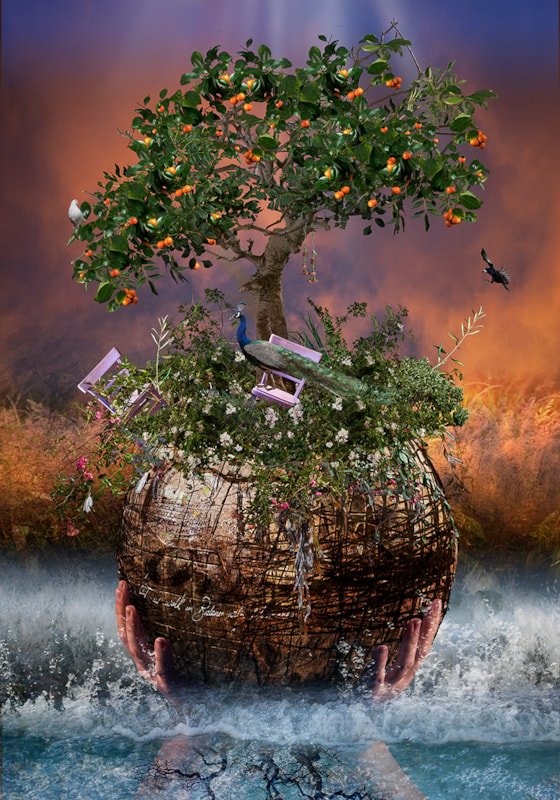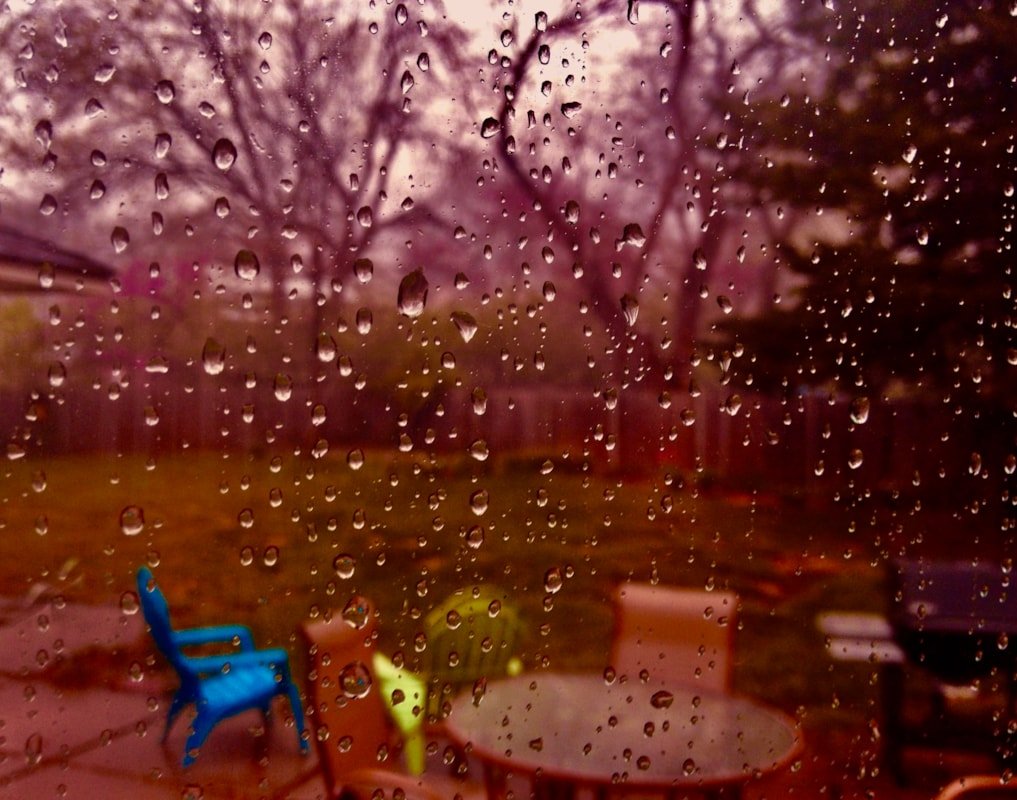THE EXHIBITION
•
THE EXHIBITION •
‘Vital stats’, ‘The Purloined Hearts Of Southern Command’, & ‘Not Joes’
Mark Kessinger was born in Huntington WV, attended college at Cleveland State University, lived in Oklahoma City and now resides in Houston TX. He is a two-year recipient of a creative writing scholarship from CSU, a founding member and president of the Houston Council of Writers, and former editor of Voices from Big Thicket. His poetry has appeared in many publications and four anthologies.
Artist - Christine Simpson, www.christinesimpsonphotoart.com
Vital stats
Perhaps in the next war
we can put every soldier's face
on a bubblegum card.
Force civilians to collect them,
thousands of new ones every day,
and issue update stickers
for all the wounded,
the missing in action,
all the dead, the deserted,
captured,
the executed.
I love stickers
as honors won,
medals given,
ribbons earned.
The public, (that is,
the non-combatant parts of the world),
may sicken of the fight
just a little quicker.
I suppress the idea
because it would really be perverted,
in true war, to where we would
only collect faces of the enemy.
waiting for 'our' official updated dead,
wounded, or captured stickers,
we would take the 'others'
to poke out their eyes with dart tips,
burn their faces with flame,
boil the disfigured cards to mush...
which we would use for magic spells
and prayers for death and plagues
and our teeth would rot out by the fistfuls
from the bile we poison ourselves on!
How easily war gets away from us.
The Purloined Hearts Of Southern Command
Ms Hometown Rose
was recruited by error.
She received the draft notice
via mistake of her
shortened surname.
An unnatural twist that
birthed empathy.
She sent her photo
to the first Joe
who showed it around.
Naturally.
She got other letters.
Naturally.
Her picture showed
a real honest to goodness goddess,
a stateside beauty queen with
girl next door give-a-damn.
She kept copies of her letters
from over three hundred Joe's
under her bed, in files, boxes,
on her side of the attic.
In time, they would all
come home, or die there.
In time, they would all forget.
Naturally.
Beauty queens get buried
with all the other memories of the war,
all the things real life sweethearts
and wives might not understand.
Her letters died in the fires
of a jealous ex-husband
who never served in war,
or, as she puts it,
just never served.
Not Joes
In a war with some name,
we, the not-Joe's, did not go.
Never went. Never knew.
It was a test given
and not taken,
graduation held but not
attended, an
initiation of fire
not felt.
Most of the generation
un burned
un scarred
un healing
marches on.
The sound of the missing drummer
flying the blank flag,
vacant colors,
without declaration
or distinction,
knowing what it is
to be left alive.
Burdened with virginal courage,
un expose guts,
un tried fortitude.
Lucky in the draft,
lucky in life,
we drink without the
grateful tastes
of the seasoned survivor.
Unworthy of the actual
survivor's guilt
denied to civilians,
we live our
non-veteran lives, and
most likely meet our fates
with non-valor.
Unless, we do our duty
to cherish, cradle, and
deliver on this peace dividend,
paid for by the dead,
and those who's duty
was not to die.
Mark Kessinger was born in Huntington WV, attended college at Cleveland State University, lived in Oklahoma City and now resides in Houston TX. He is a two-year recipient of a creative writing scholarship from CSU, a founding member and president of the Houston Council of Writers, and former editor of Voices from Big Thicket. His poetry has appeared in many publications and four anthologies.
‘Feathers and Bones’ & ‘Erosion’
Sierra Tufts is a writer living in Pennsylvania who received her MFA from Arcadia University. Her flash fiction has been published in 805 Lit + Art. She has also published poetry in two anthologies—Hey There, Delilah! by Wingless Dreamer and New Voices – Spring 2024 by Moonstone Arts Center.
Artist- John L Gronbeck-Tedesco
Feathers and Bones
I lied to a priest
at the age of eight.
My sins would be forgiven
if I was sorry.
There are only three things
bodies need to survive—
forgiveness isn’t one.
I was a bride for the first time
at the age of nine.
I walked down the aisle toward
a wrinkled, balding man.
He presented my husband—
a thin, tasteless wafer I was
told became His body.
I took back my original sin
at the age of fourteen.
I stained every spec of white
with the blood dripping
from the gaping holes
where I ripped apart my wings
and scattered the ground with
feathers and bones.
Erosion
Raindrops falling down a windowpane
You leave me
S-l-o-w-l-y.
Your laugh, a
chuckle
giggle
chortle
snicker
I can’t remember.
Were those earthen locks softer than the blanket I clutch?
A smile that lit up a room—an exaggeration?
I rip through the pages,
Entreating one photo after another
“Please remind me.”
Still those raindrops fall off the edge
to oblivion
Another piece of you
fades
away.
Sierra Tufts is a writer living in Pennsylvania who received her MFA from Arcadia University. Her flash fiction has been published in 805 Lit + Art. She has also published poetry in two anthologies—Hey There, Delilah! by Wingless Dreamer and New Voices – Spring 2024 by Moonstone Arts Center.
‘Bunhill Field’, ‘Dinosaur Footprints’, & ‘Only the Forest Remembers’
Andre F. Peltier (he/him) is a Pushcart and two time Best of the Net nominated poet and a Lecturer III at Eastern Michigan University where he teaches literature and writing. He lives in Ypsilanti, MI, with his wife and children. His poetry has recently appeared in various publications both online and in print. His poetry collections Poplandia and Ambassador Bridge are available from Alien Buddha. He has another collection forthcoming in 2024: Petoskey Stones from Finishing Line Press.
Artist- John L Gronbeck-Tedesco
Bunhill Field
Early spring in Islington,
hyacinths poking through,
daffodils in bloom,
even the magnolia trees
exploding.
Walking three blocks
to Bunhill Field
through London sun
and crowded sidewalks.
Bunhill Field,
eternal home of Daniel Defoe,
John Bunyan.
The grounds where Isaac Watts
forever sings “Joy to the World.”
And behind the hedgerow,
William Blake watches his city
rise around him.
Romantic prophet,
forging the reign of Urizen
who watches and waits.
Urizen watches and builds
the walls of his
chartered metropolis.
Urizen builds walls
and hammers mighty chains
to keep his people in check.
And there lies William Blake,
visionary with crown of light
and trees full of angels.
South in Peckham Rye,
those angelic trees
glowed and pulsed,
sending letters of love
and rebellion to the dungeons
of the Tower of London.
Wordsworth called him a madman,
and mad he was, but those visions,
from the heart of Islington,
awaken the grand city
and guide us toward tomorrow’s
fantastical sleep.
Dinosaur Footprints
Aqua-marine spray paint
on weathered ply-wood:
“DINOSAUR FOOTPRINTS, NEXT LEFT.”
Not knowing what to expect,
we signaled, pulled into the gravel lot,
and stepped out to the blast furnace
of June in northern Arizona.
Under an awning,
folding tables filled
with turquoise rings,
necklaces, bracelets, all for sale.
Local mothers keeping
food on the table
and love in their hearts:
“You guys want a tour?”
a young woman asked.
There was a crumpled five
in my pocket,
I handed it to her, and we set out
across hardened Jurassic mud.
“Here, dilophosaurus,
they probably didn’t actually spit venom
like in the movie,
and there, our state dinosaur, sonorasaurus.
You can tell its giant gate
by measuring one print to the next.”
As we walked back in time,
200 million years to when
that shallow sea covered the Moenkopi flats,
as we stepped back in time to witness
the pinnacle of 19th Century
Navajo freedom,
we sipped our bottled water
and munched week-old trail mix
from out our shiny new REI backpack.
“And here,” she said,
spilling water at our feet
to highlight the indentations,
“you’re standing in the print of a T. Rex.”
70 million years of wind, rain, erosion,
and there we stood.
We thanked her, wished her luck,
and headed out.
We had to make Kayenta
for those 1:00 PM fry bread tacos
and our lunch date at
JoD’s laundromat.
Only the Forest Remembers
Only the forest remembers
and us.
The sturdy, low boughs
held us in our youth
as we climbed.
The upper twigs swayed
and bent in the wind.
From the tops,
through leaves and clouds,
the sailboats shined
on silver waters.
Waters running from
Chicago to Alpena,
Detroit to Montreal.
The waters follow that highway
of sorrow and forgetfulness,
Mackinac to Mobile,
Timbuktu to Shangri-La.
Only the forest remembers
the broken shale.
Knee deep shards
lined the gulch
carved by ancient ice and snow.
When the glaciers receded
and the Pleiades fell
to sandy shoreline solitude,
when sumac burned crimson,
vermillion, jasper before
November’s gale,
before Friday nights at Curtis Field,
water and wind worked their magic
and the Devonian hexagons
bleached in the drought
of August.
Only the forest remembers
and those warm midnight stars.
We found Sagittarius
in the eastern sky
and The Dipper’s double glow.
Ptolemy knew the archer
was thirsty.
Ptolemy knew when
the hunt was lost.
And with that J. C. Penny telescope,
we knew the lunar mountains.
Shadows cast ‘cross craters
and ‘cross benighted minds
of childhood’s fancy.
With astral projection,
we never looked back.
Only the forest remembers
those long days
spent as mountain men, trappers,
and Allied soldiers
slinking across enemy lines
to blow ammo dumps
and liberate France.
Each broken branch a Winchester
or an M1 Garand.
Each of us, Lee Marvin or John Wayne.
“Say your prayers,
you Nazi bastards!”
we called wading through trout lilies
and barberry thorns.
“We have you in
our sights!”
Only the forest remembers
and us.
Those long, lazy afternoons
biking through the trees.
Catching air off exposed roots,
we soared like harriers.
Rounding embankments
with no hands.
“Look ma!” we called to no avail.
Parents weren’t watching.
Our summers remained
unsupervised, remained free.
They’d call us for dinner;
we’d run home for tacos
or hamburgs and hotdids
before returning to the woods
to live out grandiose lives
until bedtime called
us home again.
Andre F. Peltier (he/him) is a Pushcart and two time Best of the Net nominated poet and a Lecturer III at Eastern Michigan University where he teaches literature and writing. He lives in Ypsilanti, MI, with his wife and children. His poetry has recently appeared in various publications both online and in print. His poetry collections Poplandia and Ambassador Bridge are available from Alien Buddha. He has another collection forthcoming in 2024: Petoskey Stones from Finishing Line Press.
‘Shell Shock’, ‘Riot Police’, & ‘Just One More’
Scott Sorensen is currently pursuing an English degree at Dartmouth College. He hopes to become an English teacher and be famous on the way.
Photographer- Perseverance Fey
Shell Shock
I always thought that was a funny term
That should only apply to soldiers with beach-related trauma,
Or maybe to little Sally,
Who got so goddamn tired of selling seashells by the seashore
That she quit and got her MFA,
Only to be haunted in every poem
By those sharp pink edges.
I never thought shell shock would apply to you and me,
Sitting across from each other at the dinner table.
You dive over to tease me
(Like you always did)
And I bury my face in my hands
(I never did this)
And you look at me for a moment
As the smile falls off your face.
Three nights in a row,
I dreamt that I spoke with you.
Three times we made up in the dead of night
And three times I woke up just to find you
Absent from my side;
Your forgiveness rolled in and out like the tide,
So please understand
If I’m hesitant to receive it now.
I do believe that Sally can recover,
That one day she can give her demons a burial at sea
And go to sleep without her tongue
Tied in knots.
I believe that soldiers can reacclimate
To eating lobster rolls,
To seeing mayonnaise instead of mortars,
And I believe that you and I can sit together again.
Just not tonight.
Riot Police
These policemen maintain their composure better than anyone I’ve met in my entire life.
These men are meaty scarecrows,
Brows high and eyes straight forward,
Staring at...
What, exactly?
What’s behind us?
I wonder if it’s any scarier than what’s in front of us.
I tell one a dad joke
And challenge another to rock paper scissors
(He respectfully declines with charged silence)
While a girl twenty feet away screams in a man’s face
That he ought to be ashamed of himself.
Both men react exactly the same way:
Silence.
My friend the nude model once told me he did complicated math in his head
When he didn’t want to acknowledge the fact that people
Were staring at his genitals.
I wonder what kind of calculus these officers are doing.
Maybe it’s chemistry–
The face masks certainly look like it.
It seems unfair to scream at meaty scarecrows,
Because I bet ten years ago half of them would have been screaming alongside us.
When you’re an adult, you’ve got responsibilities,
And some days it’s your turn to wear the clown suit.
When this cop gets home tonight,
I bet his wife will be up waiting for him.
She’ll have been worrying herself sick,
And they’ll sit down in the dining room
And he’ll put his head on the table.
He’ll tell her you call a cow without legs
Ground beef.
Just One More
Outside of Beta Gamma fraternity, you and I run into three Europeans
And they offer us a cigarette.
At this point I am drunk enough that the night
Moves in stop-motion,
But when it’s lit
Even I can tell that I feel nothing.
Maybe we lit it from the wrong end,
Like my dad in grad school;
Maybe we’re not doing it right.
Nope, we smell like shit–
It’s working.
Every time I do this it comes up empty,
Tasting for all the world like putrid orange peels,
But every time I see that speckled little stick
I gotta try it.
I’m like an underage kid at the bar,
A virgin on Tinder–
I haven’t won yet but this time I’m feeling lucky.
The cigarette’s halfway gone and I tap the ash onto my tights
Which miraculously do not burst into flame,
But I can tell from your scowl that you’re not enjoying this either.
We could stamp it out now under our heels
But I like the way it’s held,
Falling away from me then pulled back
Like a girl who I don’t really love
But can’t let go.
I’ve heard that cigarettes are great after sex.
I’ll let you know once I find out
What either one is meant to feel like.
The cigarette’s gone out, by the way;
I’m holding an ashen stub of tobacco
And the Europeans have wandered off to Chi Delt
And still, neither one of us feels any sort of
Head buzz.
Shit.
I bet you the next one would have done it.
Scott Sorensen is currently pursuing an English degree at Dartmouth College. He hopes to become an English teacher and be famous on the way.
‘An Eye for the Box Scores’, ‘The Biggest Tip’ & ‘Finer than frog hair split three ways’
John Peter Beck recently retired from the labor education program at Michigan State University where he still co-directs a program that focuses on labor history and the culture of the workplace, Our Daily Work/Our Daily Lives. His poetry has been published in a number of journals including The Seattle Review, Another Chicago Magazine, The Louisville Review and Passages North among others.
Photographer - Tobi Brun
An Eye for the Box Scores
Two sausage biscuits ago,
the coffee on the dash
was hot. He’s read
the paper twice since six,
waiting in the fog for planes
that never arrived.
I’m his first for the day,
a shorter run than he’d like
only to get back in line again.
He’s dropping me home
wishing he was home.
He’d park the cab, close
the blinds and sleep.
He rolls back out
my driveway and stares down
at the box scores.
He’s seeing and not
seeing them again.
The Biggest Tip
The tourists
wouldn’t let it go,
wanted to talk
about it all the way
to the Opryland Hotel:
the glitz, the dirt
and the glamor.
“Who is the most
famous person,
the biggest celebrity,
the most memorable rider
you’ve had in your cab?”
Exiting the Briley Parkway,
He finally told them,
“When you leave a $1000
tip today on top
of the $47 fare,
I can promise you,
you’ll be the ones
I’ll never forget.
“Finer than frog hair split three ways”
I know that I’m color-starved.
I can tell in the cool of late night
when I drift out onto the porch. The stars
shine down but I want a wild red sky
or dark green or baby blue.
There are better things in life
but not in mine. I lay awake
in the early hours before milking
and dream of your blond hair
on someone else’s pillow.
John Peter Beck recently retired from the labor education program at Michigan State University where he still co-directs a program that focuses on labor history and the culture of the workplace, Our Daily Work/Our Daily Lives. His poetry has been published in a number of journals including The Seattle Review, Another Chicago Magazine, The Louisville Review and Passages North among others.









